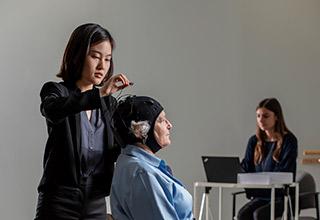How to Support Your LGBTQIA+ Grandchild
Not sure how to be there for your LGBTQIA+ grandchild? Unconditional love is the most important takeaway.

At NewBridge on the Charles in Dedham, MA, a group of caring grandparents gathers monthly for an LGBTQIA+ discussion group. The group formed after NewBridge hosted Nick Teich, founder of a summer camp for transgender and nonbinary youth, as a guest speaker. Nick’s widely attended speech inspired this dedicated group of grandparents to continue learning and growing.
Members don’t have to share why they’re there, and discussions are kept confidential. However, one common theme is how to be a supportive grandparent to LGBTQIA+ grandchildren, and that’s a topic worth exploring further. Here are some of the biggest pieces of advice I can offer when it comes to supporting your grandchild:
Offer unwavering support and love
LGBTQIA+ youth face a lot of challenges in today’s world. Depending on where someone lives, their experience at home, school, and in the larger community can vary greatly. A person may have a loving and supportive family but face bullying at school. On the other hand, they might have an accepting school environment but an unwelcoming home life.
LGBTQIA+ identities have also been highly politicized, especially when it comes to transgender and nonbinary identities. Sometimes that doesn’t give these kids much space to simply be children.
As a grandparent, you can be a beacon of support. Grandparents can often have the unique opportunity to have a meaningful relationship with their grandchildren that’s less loaded or has fewer expectations than the relationship they have with their parents. As a grandparent, you can foster a relationship entirely around providing support and love.
Still, it’s important to understand that your grandchild may not want to discuss their sexuality or gender identity with you. Your excitement and openness may prompt them to tell you more about that aspect of themselves, but they may also simply want your acceptance without discussing it. The most important thing is that you show love to them — no matter what.
Become educated
Educating yourself is an important step you can take to understand your grandchild’s identity better. If you aren’t sure what the difference is between terms like “gender,” “sex,” and “sexuality,” reading up on them might not be a bad idea!
You can read a great article about understanding gender identities here. It defines the term gender and discusses nonbinary genders in more detail.
Grandparents can help parents process their emotions and share resources, especially if working parents have less free time to look for educational materials.
Give yourself grace if you make mistakes
Do you love your grandchild unconditionally? Are you doing your best to learn and grow? If the answer is yes to these questions, you’re doing great! Your grandchild’s LGBTQIA+ identity may be entirely new for you, and it may take you some time for you to get things right.
If you accidentally use the wrong name or pronoun, it’s understandable if you feel awkward. But try not to escalate the situation by making a huge deal from a simple mistake. It’s okay to apologize, correct yourself, and move on. Older adults aren’t the only ones who make mistakes or assumptions about gender and sexuality, and it’s not necessary or helpful to feel guilty about it. Your grandchild will see the effort you’re putting in and appreciate it.
If your grandchild is transgender or nonbinary and is using pronouns or a name that you aren’t used to, there are ways you can practice so that calling them their correct name and honoring their pronouns comes more naturally to you. First, changing their name on your phone is a great idea so that you see the correct name every time they call or text you.
You can also ask a trusted friend or family member to practice using the correct pronouns with you. For example, you can ask a friend if they would listen to you tell a story about what you and your grandchild did the last time you were together. That way, you can practice using your grandkid’s correct pronouns in a low-stakes conversation.
Come to terms with your misgivings and fears
Reconciling with long-held religious beliefs
If you come from a religious background, your grandchild’s identity may not fit your tradition’s ideas about gender or sexuality. If you are wrestling with these religious questions alongside wanting to love and understand your grandchild — have compassion for yourself! It’s possible to untangle those feelings and stay strong in your tradition without excluding LGBTQIA+ community members.
You can find many examples of LGBTQIA+ rabbis, ministers, and other religious leaders who are authentic to themselves and their traditions. These leaders can be great resources if you need someone to talk to. Working through these complicated feelings with support systems other than your grandchild can prevent you from unintentionally hurting them or making them feel unaccepted.
Debunking a common misconception about transgender youth
A common misconception that some grandparents have when they learn about their grandchild’s nonbinary or transgender identity is that it means they will immediately start taking hormones or receive gender-affirming surgery as a minor.
If your grandchild tells you that they are transgender, don’t assume that automatically means their doctor is going to advise surgery. There’s a lot that happens before a medical transition, and most transgender and nonbinary people do not have surgery before they are 18. For example, they may experiment with growing out their hair or using makeup. The Human Rights Campaign offers a great resource to help you get the facts on gender-affirming care.
Finding space to express your fears about their safety
If you have an LGBTQIA+ grandchild or other family member, you may have fears regarding their safety. The political climate can be scary, and there are often headlines about anti-LGBTQIA+ legislation in the news. You may need space to express those fears and concerns — not by pouring fear into your grandchild, but with other safe outlets, such as others experiencing similar concerns about their own loved ones.
If you’re feeling anxious about your grandchild’s safety, there are a few strategies you can try to feel better. One is to ground yourself in the reality of their lived experience. Your grandchild may not feel scared! They may feel supported at home, have an accepting group of peers at school, and feel secure and confident about their future.
You can also try to remember the community’s resilience. The LGBTQIA+ community and other marginalized communities have persevered throughout history and will continue to do so.
Lastly, it may help you to get curious about what your grandchild loves about their gender identity or sexuality or to listen to interviews with other LGBTQIA+ people about what they love about their identities. While the fears may still be present for you, it can be encouraging to put the beauty and joy of transgender, nonbinary, gay, lesbian, bisexual, intersex, asexual, and queer identities at the center of your heart.
Experience our inclusive approach to senior care and living
At Hebrew SeniorLife, we are dedicated to providing inclusive care and a welcoming home for all. LGBTQIA+ life and culture are part of the norm, and our LGBTQ+ chaplain residency supports residents, patients, staff, and family to offer affirming spiritual care.
Are you interested in learning more about our services? Contact us today for more information!
Blog Topics
Learn More
Spiritual Care Programs
Spiritual care programming is an important part of life on every Hebrew SeniorLife campus, with a full team of interfaith chaplains available to connect each resident, patient, and family member with the spiritual resources that resonate most for them.
Innovation at HSL
Whether we're making discoveries or developing new teaching methods, HSL continuously works to improve the lives of older adults.





